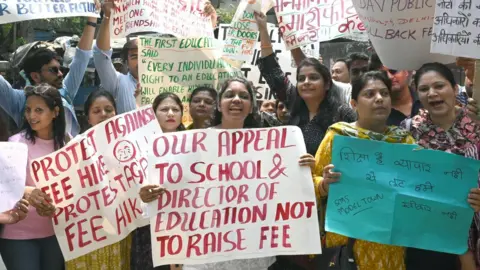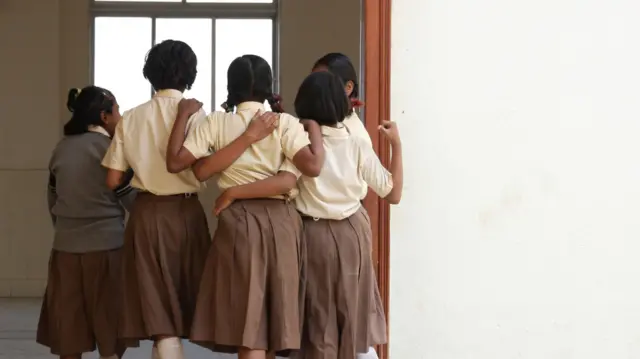In cities across India, parents are protesting against soaring private school fees, claiming these steep hikes are financially unsustainable and emotionally taxing for their children rising school fees. From Delhi to Pune and Hyderabad, families are fighting back — not just for affordability but for the right to education itself.
One Student’s Ordeal: Barred from Exam
Fourteen-year-old Aaditya Mattey was ready to take his English exam at Delhi Public School (DPS) Dwarka. But shortly after entering the classroom, he was escorted out by school security. His only fault? His father refused to pay a disputed fee hike.

“My son was confident and prepared. Instead, he was made to feel like a criminal,” says Divya Mattey, Aaditya’s father, who alleges the school unilaterally doubled the annual fee from ₹93,400 in 2020 to ₹189,096 in 2025-26. DPS Dwarka reportedly removed Aaditya and several students from its rolls for non-payment.
The school has not responded to media inquiries, but court documents show the institution citing a ₹490 million loss last year as justification for raising fees. Critics say this move violates Delhi’s education rules, which require government approval for any fee increase by private schools operating on leased public land.
A Nationwide Protest Movement
The issue isn’t isolated to DPS. More than 80% of parents surveyed by LocalCircles said their children’s school fees had increased by over 10% this year, with some hikes in Delhi, Mumbai, and Bengaluru reaching 30-45%.
“We’re not against paying fees,” says Gagandeep Singh, a parent in West Delhi. “But we can’t support arbitrary hikes without transparency.” Singh claims Mira Model School raised fees 45% last year and rejected his cheque for the approved amount this term rising school fees.
In April, hundreds of Delhi parents protested outside the Directorate of Education. The demonstrations grew after reports that DPS allegedly confined students in a library and hired guards to block classroom access over unpaid dues rising school fees.
Legal and Legislative Gridlock
India lacks a centralized regulatory framework for private school fees. Instead, each state sets its own limits — with varying degrees of enforcement. In Maharashtra, a 15% fee increase is allowed every two years, while Karnataka permits a 10% annual rise if audited. But legal loopholes and delayed court cases often leave families with no timely recourse.

To address mounting pressure, the Delhi government on 10 June approved the “Delhi School Education (Transparency in Fixation and Regulation of Fees) Ordinance, 2025.” Education Minister Ashish Sood claims the bill will introduce tougher oversight, but it still awaits the Lieutenant Governor’s assent rising school fees.
Supreme Court lawyer Shikha Sharma Bagga, part of a group called Justice for All, supports the initiative but insists on stricter implementation. “There must be mandatory financial audits before every academic year so parents know exactly what they’re paying for,” she said rising school fees.
Private Schools Say They’re Struggling Too
School managements argue they’re grappling with rising operational costs, increased teacher salaries, and overdue government reimbursements for students from disadvantaged backgrounds. A notice on DPS Dwarka’s website blames a “small group of parents” for “spreading false and malicious information” about the fee structure.
Still, the impact on students is undeniable. Many children report anxiety and confusion as their education is jeopardized by financial conflicts they don’t understand.
“My son should be studying, not wondering if he’ll be allowed in school tomorrow,” says Mattey. Despite media reports that DPS agreed to reinstate expelled students, his child has yet to receive assignments or confirmation of re-enrollment.
Families on the Brink
Pankaj Gupta, who runs a small shop in Delhi, says his son’s school increased fees by 25% this year — without prior notice. “We had no choice. We had to pay,” he says, adding that online retail and pandemic losses have already strained the family’s finances rising school fees.

Another mother, speaking anonymously, says she’s considering withdrawing her son due to an “unsustainable” 30% hike. “Even with two incomes, we can’t keep up. But where do we go if every school is the same?”
The Bigger Picture
India’s reliance on private education stems from widespread dissatisfaction with public schools. While the government promises reform, many say it’s too slow and opaque. Without intervention, rising fees could widen inequality and push more families into debt — or force children out of classrooms entirely.
Related: Indian Students Protest Over Exam Cancellations Amid Heatwave Crisis